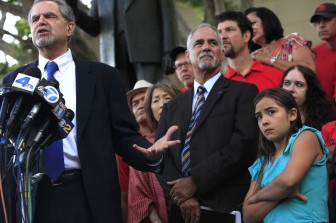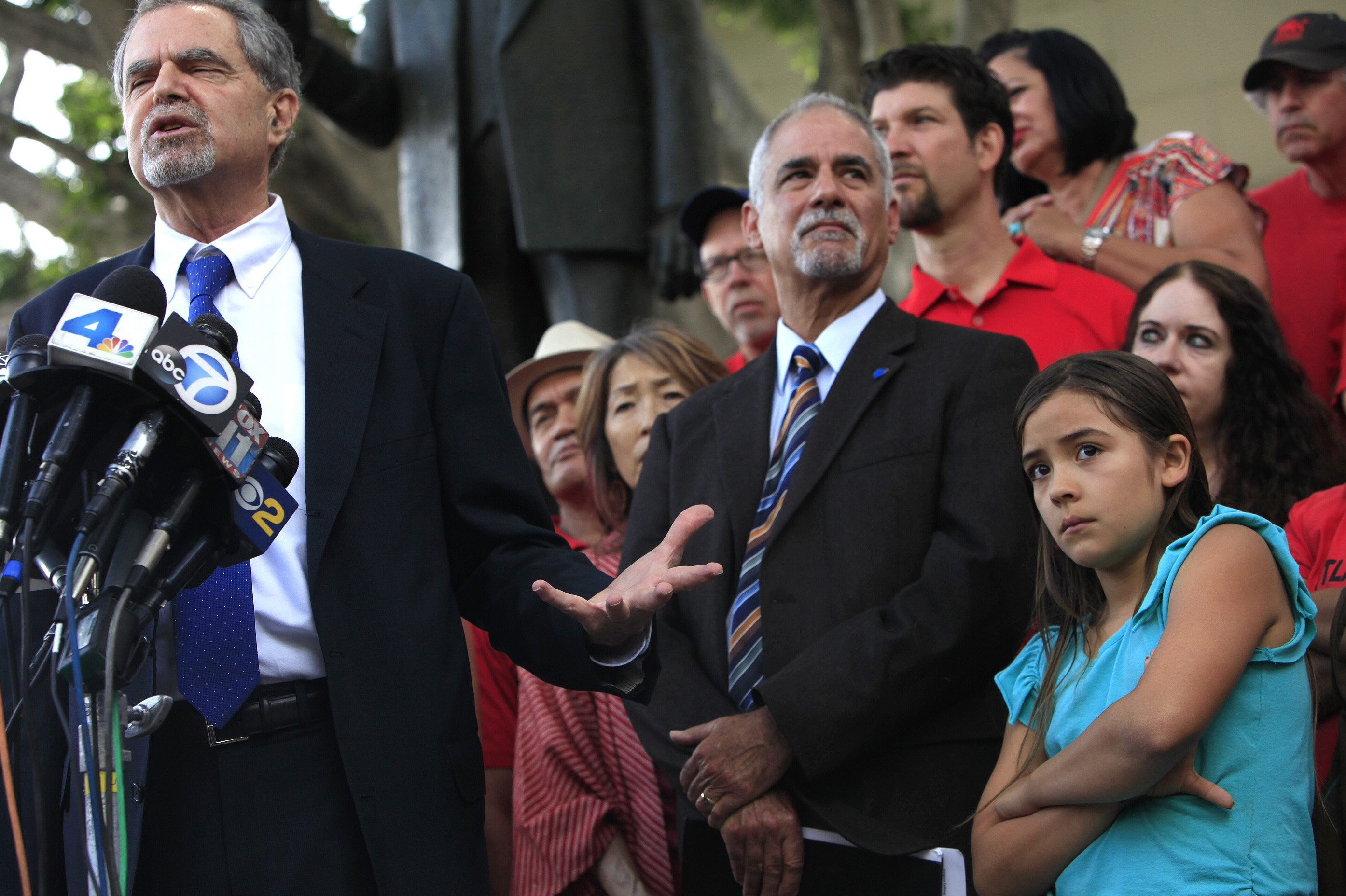
Attorney Glenn Rothner speaks during a press conference outside the Stanley Mosk Courthouse in Los Angeles after an L.A. County Superior Court judge ruled Tuesday, June 10, 2014 that key job protections for California teachers violate the state\’s constitution. (Francine Orr/Los Angeles Times/MCT)
From Education News:
On Tuesday, Los Angeles County Superior Court Judge Rolf Treu cited Brown v. Board of Education while ruling that “all students are entitled to equal education”, adding that “the current situation discriminates against minority and low-income students in placing ineffective teachers in their schools” reports Linda Deutsch for theAssociated Press. The “current situation” is described in Treu’s decision.
“Plaintiffs claim that the challenged statutes result in grossly ineffective teachers obtaining and retaining permanent employment, and that these teachers are disproportionately situated in schools serving predominantly low-income and minority students,” the decision said.
Nine students had brought the lawsuit to the court, and the judge agreed with them. Tenure and other such job protections for California public school teachers have been ruled unconstitutional. In other words, according to Judge Treu, the statutes violated the students’ fundamental rights to equality of education. He added:
”…there is also no dispute that there are a significant number of grossly ineffective teachers currently active in California classrooms.”
 The California ruling will definitely have an impact on other states which are also grappling with this issue. As the nation’s most populated state, this is a landmark decision that has the the power to change the profile of education in California and across the US. Theodore Boutrous, attorney for the plaintiffs, predicts that other states will begin to look at their statutes to determine if theirs, too, can be changed. The reaction will possibly trigger a ‘what’s wrong with education” referendum that will be far reaching.
The California ruling will definitely have an impact on other states which are also grappling with this issue. As the nation’s most populated state, this is a landmark decision that has the the power to change the profile of education in California and across the US. Theodore Boutrous, attorney for the plaintiffs, predicts that other states will begin to look at their statutes to determine if theirs, too, can be changed. The reaction will possibly trigger a ‘what’s wrong with education” referendum that will be far reaching.
During the two months of testimony, specific ramifications caused by ineffective teachers were disclosed.
Treu said evidence at the trial showed the specific effects of ineffective teachers on students. “The evidence is compelling,” he said. “Indeed, it shocks the conscience.”
An extensive study showed that one year with an ineffective teacher costs the students in the class $1.4 million in lifetime earnings, and it can take between 2-10 years to fire an incompetent teacher at a cost of @$250,000-450,000.
Beatriz Vergara and eight other students said that their teachers had let classrooms get out of control, were often unprepared in class, and told them they would never amount to anything.
Judge Treu said that he could not mandate what the legislature should do to solve this problem, but he trusted that legislators would come up with ways to uphold the constitution and to provide a “basically” equal opportunity for a quality education.
Treu also said that he knew there would be political implications from the decision, but he stood by his efforts to consider the evidence and law. Treu placed a stay pending an appeal.
Backing for the lawsuit was provided by David Welch, a Silicon Valley entrepreneur. His non-profit, Students Matter, assembled a legal team, including Boutrous, who represented George W. Bush before the Supreme Court in the 2000 Florida vote recount.
Welch said that he was ecstatic. He stated that the challenge now was to find solutions to the problem.
The Vergara v. California decision finding state teacher protections unconstitutional is a “mandate” to fix “laws, practices and systems that fail to identify and support our best teachers and match them with our neediest students,” U.S. Education Secretary Arne Duncan said in a statement Tuesday.
California Public Radio KPCC reports that the decision found that tenure, firing, and disciplinary issues toward teachers violate students’ rights to an adequate education. Los Angeles’ Superintendent John Deasy said he would quickly begin his meetings with lawmakers and officials to correct the protection laws. He thinks that there should be no appeal.
“Every day administrators are spending thousands upon thousands and countless hours trying to dismiss ineffective teachers. That money should be spent on procuring new supplies, instituting new programs, improving teacher salaries, securing critical services for both the professionals and the students, and reducing class size.”
One of the nine plaintiffs, Julia Macias, says she was glad that she had stepped forward to fight for educational equality. The California Teachers’ Association said it plans to file an appeal.
Counsel for the plaintiffs,and an attorney for Students Matter, Joshua Lipshutz spoke on KPCC’s “Air Talk”.
“Lots of our most brilliant and enthusiastic young people who want to be teachers don’t go into teaching because they know seniority rules under the current system,” Lipshutz said. “In fact we had quite a few teachers who testified who were named teacher of the year and that very same year were laid off because they were the most junior member of the faculty. People don’t want to enter a profession where they’re not judged on their merit, and certainly not the kind of people that you’d want to be teachers.”
Union leaders accused the judge of favoring the plaintiffs’ lawyers. Incoming United Teachers Los Angeles said that other factors must be considered when evaluating a students ability to learn. Some barriers are huge classroom sizes, a nurse one day a week, no librarians, and no counselors, not teachers’ due process.
California Federation of Teachers Vice President Gary Ravani told KPCC that keeping teachers around longer is beneficial to students. He also cited No Child Left Behind to support his argument that using test scores to hold teachers and schools accountable is not a positive measure.
Judge Treu said that a system which takes only two years to evaluate a teacher before hiring that teacher permanently makes it extremely difficult to fire ineffective teachers. He also was opposed to the ” last in, first out” policy that allows layoffs to be determined by seniority, says Jennifer Medina writing for The New York Times.
California teachers are eligible for tenure after 18 months of employment. Lawyers for the teachers say that this change will allow teachers to be fired “on a whim”. The system, as it stands, say the lawyers, attracts talented teachers to teach, a job which does not pay well.
“We believe the judge fell victim to the anti-union, anti-teacher rhetoric and one of American’s finest corporate law firms that set out to scapegoat teachers for the real problems that exist in public education,” said Joshua Pechthalt, president of the California Federation of Teachers. “There are real problems in our schools, but this decision in no way helps us move the ball forward.”
Welch says that his non-profit is willing to fund other cases like this one in other states. He is especially interested in helping states with powerful teachers’ unions where teacher tenure laws have been challenged, but have been defeated by legislatures.
This story is reprinted with permission from Education News.


























